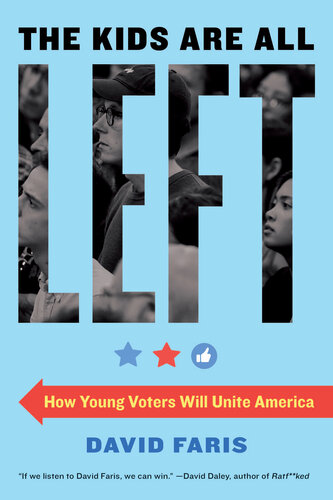
The Kids Are All Left
How Young Voters Will Unite America
کتاب های مرتبط
- اطلاعات
- نقد و بررسی
- دیدگاه کاربران
نقد و بررسی

May 15, 2020
A political analyst asserts that younger voters can sway the next election. Faris, a political science professor, mounts a convincing and rousing argument about the influence of voters in their 20s and 30s to shape a progressive political agenda for the nation. These younger voters, he writes, form a powerful threat to the Republican Party, which increasingly leans heavily on "male, religious, white, and older" voters and which has been "systematically repulsing and alienating" a new demographic: millennials and Generation Z. More diverse, more educated, and less religious than previous generations, this cohort holds progressive views on a variety of issues, including climate change, economic inequality, racial justice, and gun control. Moreover, they are revolted by "the unseemly antics, misogynist ravings, and racist policies of today's Republican Party." Faris marshals considerable evidence--laid out in tables and graphs--to support his assertion that identifying as Democrats is nothing new among young voters, who have been "marching left for twenty years." Contrary to common belief, young liberals don't morph into older conservatives. Instead, Faris finds that voting affiliation is set in early adulthood and persists throughout a person's life. He focuses some attention on the "brash, telegenic" provocateurs "intoxicated on the dizzying combination of hyper-partisanship and grifter-doofus scamming that characterizes the thought leaders of the young right." Although these outspoken conservatives are not representative of their cohort, they do find outlets--Fox News, for example--to noisily disseminate their views. Polarization, Faris speculates, will end "when one side wins a series of decisive national victories, forces people to evacuate from the losing party and convinces those who remain to change that party's trajectory." A high voter turnout and a unified Democratic Party may portend that decisive victory in 2020, but a fractured left, warns the author, would lose to a hard-right GOP. Cautious hope for democracy's future.
COPYRIGHT(2020) Kirkus Reviews, ALL RIGHTS RESERVED.

June 1, 2020
For the last twenty years, young American voters have been skewing further and further left, with no end to the trend in sight. The Republican Party depends on an aging demographic for ballot power, and if it doesn't start picking up young votes now, it may never. In this insightful and fascinating prediction, political scientist Faris (It's Time to Fight Dirty, 2018) outlines young voters' deepening blue record, and what the Republican Party would have to do to preserve power. Using polling statistics and election results from the last century, Faris tracks how millennial and Gen Z voters favor the progressive agenda. He details the policy shifts young voters will pursue (climate change, diversity and equity, workers' rights, etc.) and the major institutional changes (to gerrymandering and the electoral college, for example) that this generation will seek. The author shares hope that the Republican Party will survive in the future, though unequivocally without the party's current reliance on white supremacy. Faris' observations are sharp and data-driven as well as wildly fun to read.(Reprinted with permission of Booklist, copyright 2020, American Library Association.)

























دیدگاه کاربران